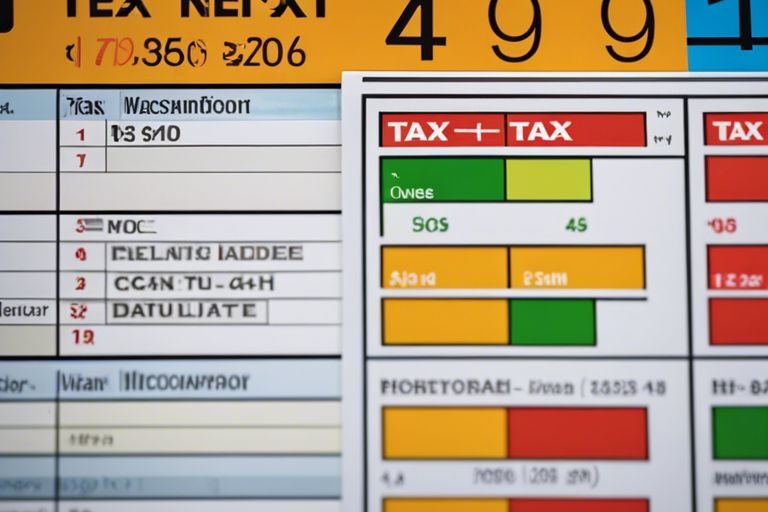5 Crucial Tax Deadlines in Malta

It’s that time of the year again when tax deadlines are fast approaching in Malta. Missing these deadlines can lead to penalties, fines, and interest which are best avoided. To help you stay on top of your tax obligations, here are 5 crucial tax deadlines in Malta that you need to be aware of. Whether you are a business owner or an individual taxpayer, marking these dates in your calendar and ensuring timely compliance is key to a smooth tax season.
The First Deadline: Income Tax Returns for Companies
Preparing Your Documentation
Your company’s income tax returns are due on a specific deadline each year. It’s important to start gathering all the necessary documentation well in advance to avoid any last-minute rush. Make sure you have all your financial records, invoices, receipts, and any other relevant paperwork organized and ready for submission.
Submission Tips and Tricks
When submitting your company’s income tax returns, ensure that all information is accurate and up to date. Double-check calculations and ensure that you have completed all necessary schedules and forms. Consider seeking the assistance of a tax professional to guide you through the process and answer any questions you may have.
- Accuracy: Double-check all information before submission.
- Professional Help: Consider seeking assistance from a tax professional.
- Organization: Keep all documentation in order for future reference.
Returns should be filed on time to avoid penalties. Ensure that you have met all the necessary requirements before submitting your company’s income tax returns. Be cautious in providing accurate information, as any discrepancies could lead to potential audits. Remember that timely submission can help you avoid unnecessary stress and penalties.
The Second Deadline: Provisional Tax Payments
Calculating Your Dues
You may be wondering how much you need to pay for your provisional tax in Malta. Your provisional tax payment is estimated based on your chargeable income for the year. It is crucial to calculate this accurately to avoid underpaying or overpaying.
Methods of Payment
For your convenience, there are several methods available to make your provisional tax payments in Malta. For instance, you can opt to pay online through the Inland Revenue Department’s website, via bank transfer, or in person at designated locations. Ensure you choose a method that is most convenient for you.
To make the process smoother, it is vital to keep track of the deadlines for provisional tax payments and make timely payments to avoid penalties or fines. Not meeting the deadlines could result in additional costs and potential legal implications. So, be sure to mark your calendar and set reminders to stay on top of your tax obligations.
The Third Deadline: VAT Returns Submission
Keeping Track of Your VAT
Unlike income tax returns, Value Added Tax (VAT) returns in Malta are submitted on a quarterly basis. Ensuring that you keep accurate records of all transactions is crucial for a smooth VAT returns submission process.
Filing Electronically: A Step-by-Step Guide
Any business registered for VAT in Malta is required to file their VAT returns electronically. This can be done through the VAT Online system provided by the Maltese Inland Revenue Department.
Keeping Track of Your VAT
| Important Details | Positive Details |
| Keep all invoices and receipts | Helps in accurate reporting |
| Record all expenses and sales | Minimizes errors in your return |
It is recommended to keep detailed records organized by quarter to simplify the VAT return process. Any inconsistencies or missing information can lead to delays or penalties.
StepbyStep Filing Electronically: A Step-by-Step Guide
| Dangerous Details | Positive Details |
| Incorrectly filled forms | Can result in fines |
| Use secure connections | Protects your data from breaches |
When filing electronically, ensure that you have all necessary information at hand, including your VAT identification number and total sales and purchases for the quarter. Being proactive and accurate will help you avoid potential complications down the line.
The Fourth Deadline: Personal Income Tax Returns
Who Needs to File?
Now is the time to start thinking about filing your personal income tax return in Malta. All residents and non-residents who have earned income in Malta are required to file a tax return. This includes individuals who are self-employed, employed, or receive income from investments.
Avoiding Common Filing Errors
Income tax filing can be daunting, but with the right approach, you can avoid common mistakes. One of the most common errors people make when filing their personal income tax return is not reporting all sources of income. Make sure to gather all your income statements and documentation before starting the filing process to ensure accuracy.
Another important point to consider is making sure your deductions and credits are accurate. Mistakes in claiming deductions can lead to penalties or missed opportunities for tax savings. Be sure to double-check your calculations and seek professional advice if needed to maximize your tax return.
The Fifth Deadline: Final Settlement System (FSS) Tax Submission
Understanding the FSS Framework
An necessary tax deadline in Malta is the Final Settlement System (FSS) Tax Submission, which falls on the 31st of March each year. The FSS is a framework that allows employees to declare any additional income not subject to final withholding tax. It ensures that all sources of income are appropriately declared and taxed.
Employer Responsibilities and Deadlines
The FSS tax submission process places important responsibilities on employers in Malta. They are required to provide their employees with an FS3 form outlining their income and tax deductions for the year. Employers must also submit the FSS return to the Inland Revenue Department by the deadline.
Another crucial aspect is that employers must ensure the accuracy of the information provided in the FS3 form to avoid any penalties or fines. Additionally, employers need to meet the deadline to submit the FSS return to comply with Maltese tax regulations.
Final Words
Drawing together the information on the 5 crucial tax deadlines in Malta can help taxpayers stay organized and avoid any penalties or late fees. By being aware of these deadlines, individuals and businesses can prepare and submit their tax returns in a timely manner, ensuring compliance with Maltese tax regulations. Bear in mind, staying informed and submitting your tax documents on time can save you from unnecessary stress and financial burdens. Make sure to mark these deadlines in your calendar and seek professional advice if needed. Happy filing!
FAQs:
When are income tax returns for companies due in Malta?
Income tax returns for companies in Malta are due on specific deadlines each year. It is crucial to gather all necessary documentation well in advance to avoid any last-minute rush.
What are some submission tips for company income tax returns in Malta?
Double-check all information for accuracy, seek assistance from a tax professional if needed, and keep all documentation organized for future reference.
How is provisional tax payment calculated in Malta?
Provisional tax payments in Malta are estimated based on your chargeable income for the year. It’s essential to calculate this accurately to avoid underpaying or overpaying.
How can businesses make provisional tax payments in Malta?
Businesses in Malta can make provisional tax payments through various methods, including online payment, bank transfer, or in-person at designated locations.
When is the Final Settlement System (FSS) Tax Submission deadline in Malta?
The Final Settlement System (FSS) Tax Submission deadline in Malta is on the 31st of March each year. It allows employees to declare additional income not subject to final withholding tax.
Recommended Posts

Financial Aspects of Doing Business in Malta
July 26, 2024

Casino999.dk & Delasport Enhance Sports Betting
July 26, 2024





